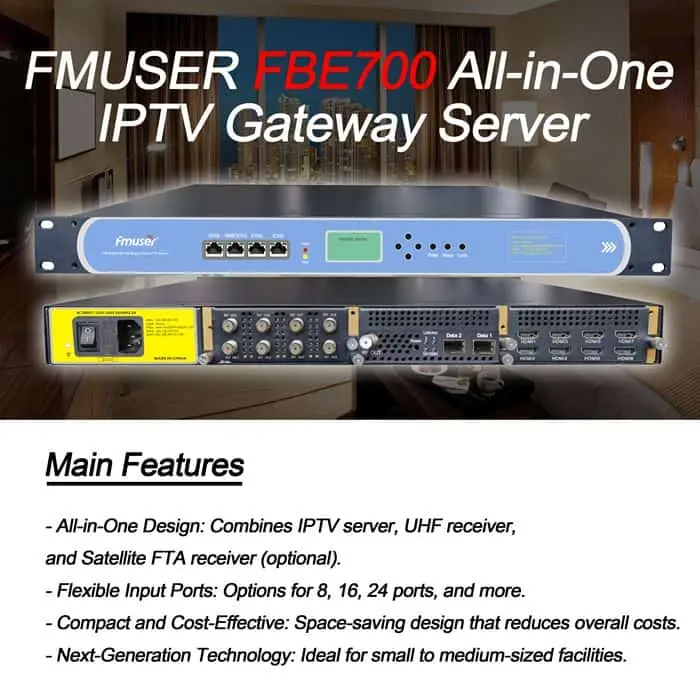
- Home
- Product
- IPTV Headend
- FTA Tuner Receiver (IRD Satellite) | FMUSER IPTV Solution
- DTV Headend Equipment
-
Control Room Console
- Custom Tables & Desks
-
AM Transmitters
- AM (SW, MW) Antennas
- FM Broadcast Transmitters
- FM Broadcast Antennas
-
Broadcast Towers
- STL Links
- Full Packages
- On-Air Studio
- Cable and Accssories
- Passive Equipment
- Transmitter Combiners
- RF Cavity Filters
- RF Hybrid Couplers
- Fiber Optic Products
-
TV Transmitters
-
TV Station Antennas
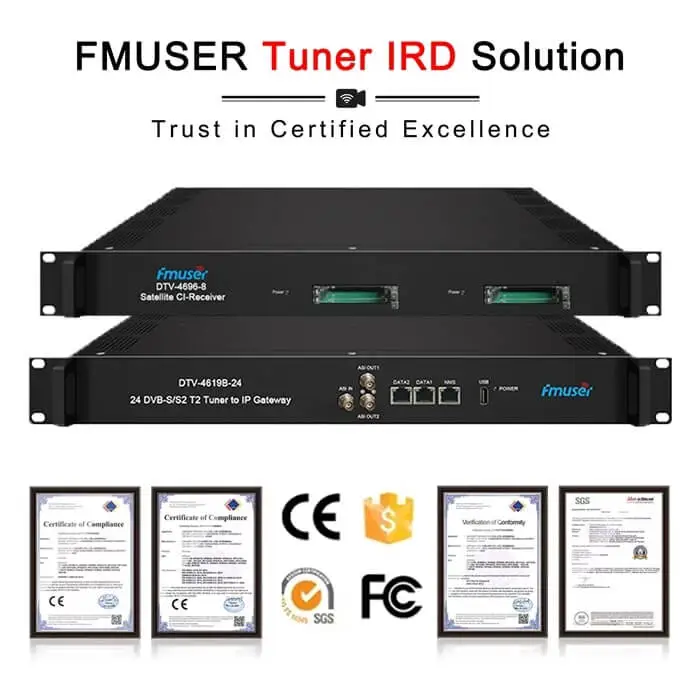
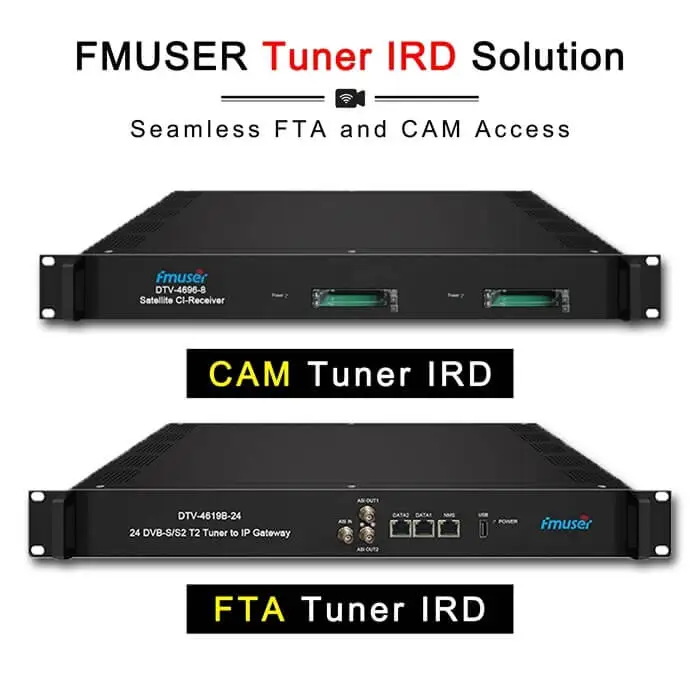
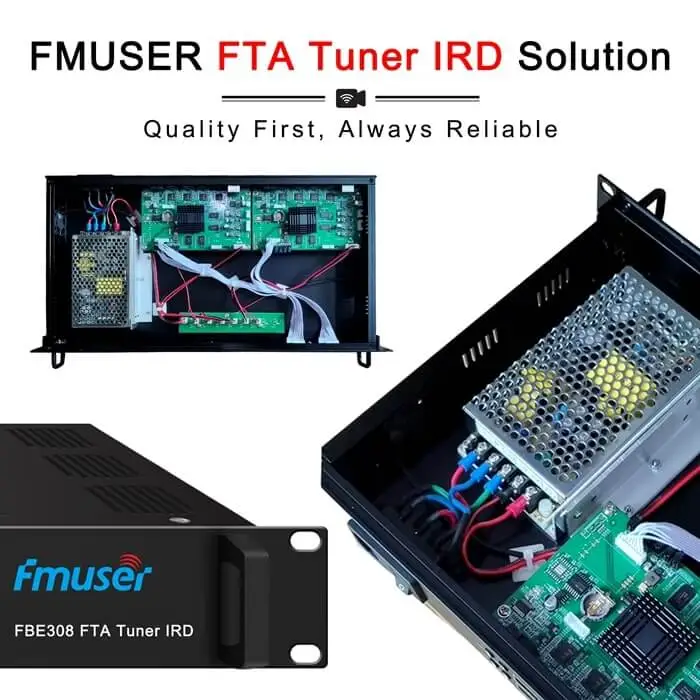
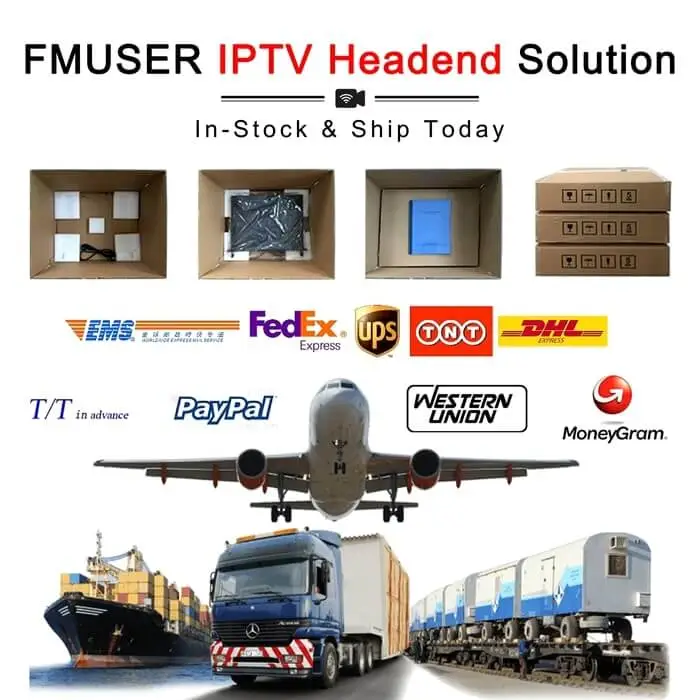
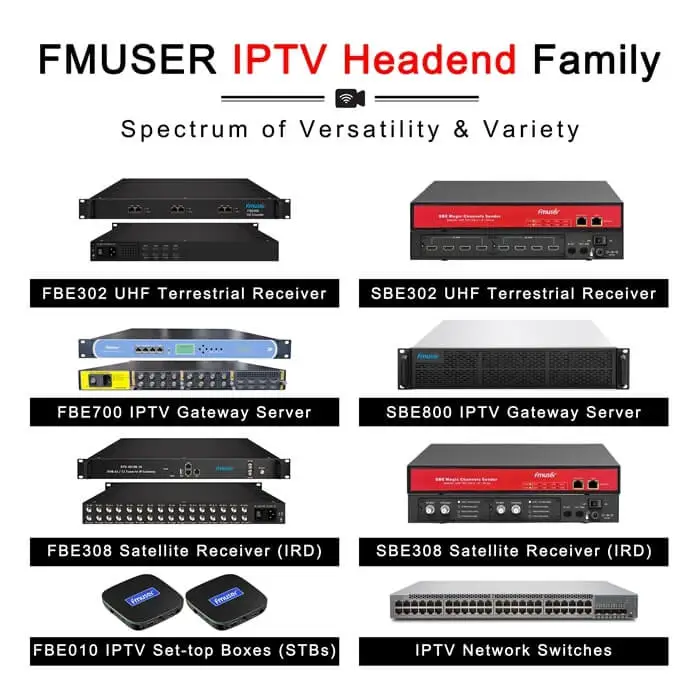
FTA Tuner Receiver (IRD Satellite) | FMUSER IPTV Solution
FEATURES
- Price (USD): Ask for a Quotation
- Qty (PCS): 1
- Shipping (USD): Ask for a Quotation
- Total (USD): Ask for a Quotation
- Shipping Method: DHL, FedEx, UPS, EMS, By Sea, By Air
- Payment: TT(Bank Transfer), Western Union, Paypal, Payoneer
- About
- Download
- FAQs
- Satellite or ATSC Decoder to SDI, IP, ASI, Closed Captions
- ATSC or QAM to IP Gateway with RF Transmodulator for IPTV Broadcast Systems
- 16-Ch RF Tuners to IPTV Gateway
- 4 RF Tuner to IPTV Gateway, ASI and 4 QAM
- IP to IRD MPEG2 / MPEG4
- 8-Ch IP TS to 8 Analog Video Decoder
- 4K Compact HD HEVC Decoder
What is FMUSER FTA Tuner IRD?
An FMUSER FTA Tuner IRD, or FMUSER FTA Integrated Receiver Decoder (IRD), refers to a professional satellite receiver primarily utilized in commercial applications (e.g. coax cable TV system & IPTV system) to enable the reception and decoding of Free-To-Air (FTA) satellite TV programs, which are broadcast without a subscription fee.
FMUSER FTA tuner IRD can be optionally equipped with XLR, ASI, SDI, AES, EBU, CI, and Ethernet interfaces, allowing for flexible integration into various systems.
👇👇 New Arrival! 👇👇
FMUSER FBE013 Magic IPTV STB Kit with RC
|
FMUSER FBE013 IPTV Smart Hotel Magic Box Kit with RC! Click here for details.
|
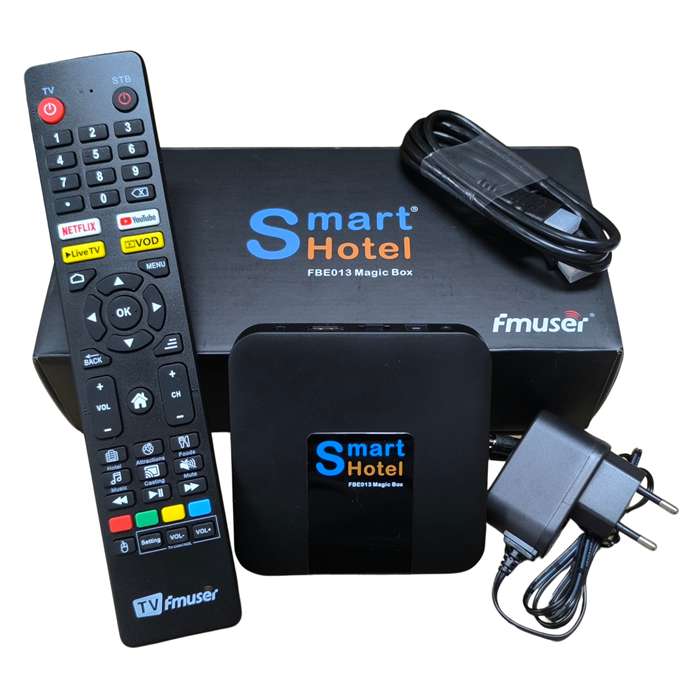 |
Additionally, it offers optional support for DVB-S, DVB-S2, DVB-T, DVB-T2, ATSC, and ISDB-T inputs, as well as IP output options such as UDP, RTP, and RTSP, ensuring comprehensive connectivity and adaptability for diverse broadcasting needs.
1. FMUSER FTA IRD & CAM IRD
While FTA is the most common input method, FMUSER also provides professional IRDs that are equipped with Conditional Access Modules (CAM) to decode encrypted, paid TV programs, although this usage is less frequent. These IRDs play a crucial role in TV headend systems, such as those found in coax cable TV and IPTV services, where they work in conjunction with other essential equipment like IPTV gateway servers and encoders to enhance the viewing experience and engagement between facilities and end-users.

Remote management of these devices is possible via Ethernet, and they can be controlled from a single point using NMS (Network Management System) software, facilitating streamlined operations across multiple locations. Many non-commercial satellite receivers are commonly used in residential areas. Unlike professional Integrated Receiver Decoders (IRDs), which can output multiple HDMI TV channels simultaneously, non-commercial satellite receivers typically provide HDMI output for only one TV channel per device.
2. FMUSER FTA IRDs Vs. Other FTA IRDs
Unfortunately, numerous low-cost FTA satellite receivers marketed as FTA IRDs are produced by obscure brands, misleading consumers into believing they can access paid programs for free. When these suppliers go out of business or experience operational failures, users may find these devices inoperable due to their reliance on proprietary software or support, rendering them useless.

Therefore, FMUSER IRD (integrated receiver/decoder) utilized in IPTV systems are essentially commercial TV headend equipment capable of receiving both FTA satellite TV programs and decoding paid services with CAMs, supporting multiple input formats such as QAM, DVB-S2, DVB-C, DVB-T, ATSC, and ISDB-T, while outputting the content in IP format to IPTV gateway servers.
This comprehensive functionality is vital for managing live TV broadcasts, allowing engineers to effortlessly add or remove channels—whether free or paid—tailored to various facilities, including hotels, apartments, and fitness centers, thereby optimizing customer satisfaction and engagement.
Recommended FMUSER FTA/CAM Tuner IRDs for You!
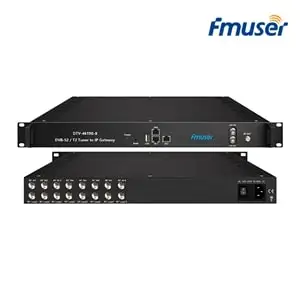 |
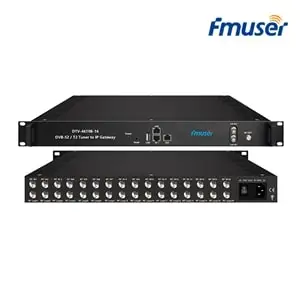 |
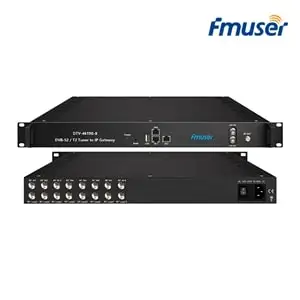 |
| FMUSER ATSC FTA Tuner IRD | FMUSER QAM FTA Tuner IRD | FMUSER DVB-S/S2 FTA Tuner IRD |
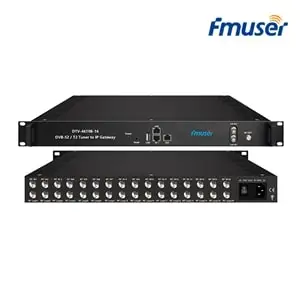 |
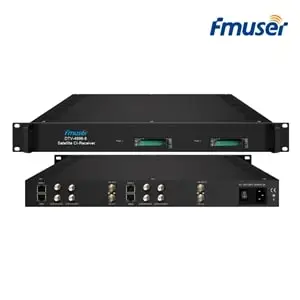 |
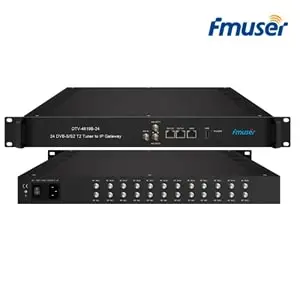 |
| FMUSER DVB-T/T2 Tuner IRD | FMUSER CAM Tuner IRD | FMUSER 8/16/24-Chan FTA Tuner IRD |
Download FMUSER IPTV Headend Solution User Manuals for More:
- FMUSER_FBE208_8-Channel_HDMI_IPTV_Encoder_Introduction
- FMUSER_FBE302_2-CAM_Satellite_Receiver_IRDs_Introduction
- FMUSER_FBE304_Multi-Channel_IPTV_Encoder_Introduction
- FMUSER_FBE308_FTA_Satellite_Receiver_IRDs_Introduction
- FMUSER_FBE800_IPTV_System_License_Authorization
- FMUSER_FBE803_IPTV_Gateway_Server_Introduction
3. Introducing FMUSER FBE700 IPTV System
FMUSER’s FBE700 IPTV System integrates the functions of an IPTV gateway server, hardware encoder, integrated receiver/decoder, and UHF terrestrial receiver — all in one compact device. Unlike cloud-based systems that require robust infrastructure and come with hidden upgrade costs, the FBE700 operates independently, allowing hoteliers to achieve total ownership and control with a one-time payment.
1) Multiple Board Options
FMUSER can quickly create and produce interfaces tailored to specific user needs, including customized input formats and the appropriate number of compatible boards. Depending on different application scenarios, we can provide the following customized board options, including:
- FTA and CAM Satellite reception board
- UHF terrestrial reception board
- HDMI/SDI codec board
- IPTV network interface board
- Coaxial RF cable output board (e.g. DVB-T, T2, ISDB-T, and ATSC)
2) Main Functions
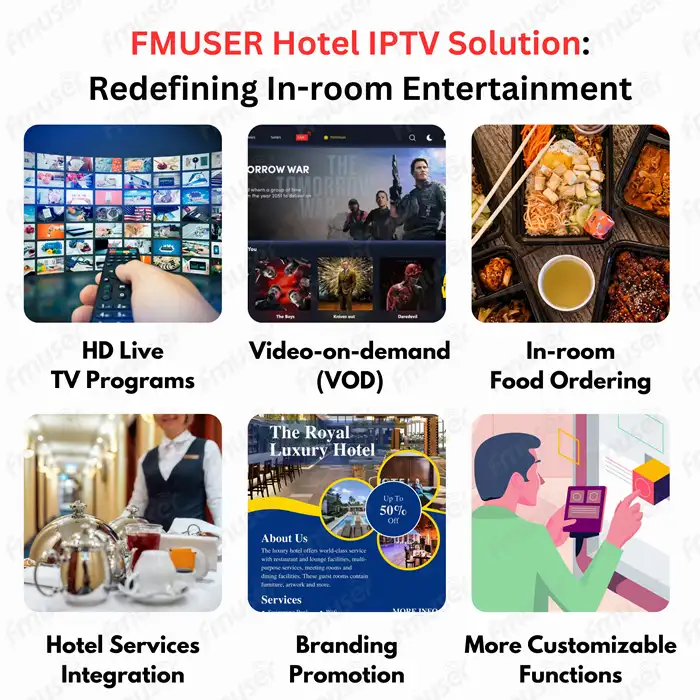
In addition to its hardware integration, the FBE700 also features an all-in-one software design that allows hotel engineers, receptionists, and other operators to easily customize various IPTV content within one dedicated CMS software as needed, including:
- Creating welcome pages with guest names
- Conveniently configuring satellite/UHF/HDMI program source signal inputs
- Providing live TV programs in SD/HD/4K and higher resolutions
- Establishing a video-on-demand library
- Uploading customized hotel introduction and information
- Adding or removing notifications and promotional scrolling messages
Whether your hotel has a few rooms or hundreds, the FBE700 can efficiently manage real-time content delivery, making it an ideal solution for the hospitality industry and beyond, including fitness centers, cruise ships, and healthcare facilities. FMUSER also provides comprehensive support, including on-site installation, 24/7 technical assistance, and custom IPTV solutions tailored to your needs.
Why Choose FMUSER FTA Tuner IRDs?
FMUSER FTA Tuner IRDs are vital IPTV headend equipment in the realm of media distribution, serving as the linchpin for accessing and delivering television content, both free-to-air and paid, to a variety of platforms.The significance lies in our ability to decode satellite signals, transforming them into accessible content for end-users in commercial environments like hotels, gyms, and residential buildings.

In a hotel setting, for example, an FMUSER FTA IRD can facilitate the delivery of free-to-air channels from satellite broadcasts, enriching guest experiences by providing a diverse range of entertainment options without incurring additional costs. When integrated into an IPTV headend system, these IRDs work in conjunction with IPTV gateway servers to deliver live TV programming in standard definition (SD), high definition (HD), and even 4K or higher resolutions, ensuring that facilities can provide top-tier viewing experiences tailored to their clientele.

This integration allows operators to seamlessly manage content, adding or removing channels based on viewer preferences while also ensuring efficient aggregation and distribution of various channels to enhance the overall quality of content available.
Notably, FMUSER IRDs used in IPTV headend systems differ significantly from those utilized in coax TV systems. The latter typically focus on basic signal processing for traditional cable distribution, whereas IPTV IRDs are designed to handle complex streaming formats, delivering high-quality video over IP networks.
Top 10 Features of FMUSER IRD Solutions
FMUSER presents a versatile line of professional IRDs, designed for commercial cable TV and IPTV system. Our IRDs cater to both Standard Definition (SD) and High Definition (HD) applications, offering seamless upgrades for operators transitioning from SD to HD while utilizing existing infrastructure.
1. Comprehensive Input and Output Ports
The FMUSER IRD series is designed with unmatched flexibility, featuring 2 or 4 tuner inputs that support multi-mode switchable options for DVB-C, DVB-T/T2, ISDB-T, DVB-S/S2, and ATSC standards. This versatile design ensures compatibility with a broad range of broadcasting technologies. In addition, the IRDs are equipped with 1 ASI input for re-multiplexing and 16 IP inputs for efficient streaming capabilities over UDP and RTP protocols. The output options are equally robust, enabling the delivery of 1 MPTS and 256/512/1024 SPTS outputs via a 1000 Base-T Ethernet interface, accommodating both unicast and multicast streaming for various applications.
2. Robust Satellite Reception
The FMUSER IRD solution excels in satellite reception capabilities, supporting DVB-S with a frequency range of 950 to 2150 MHz and symbol rates from 0.5 to 45 Msps. This ensures high-quality signal acquisition with a maximum input bitrate of ≤170 Mbps. The advanced DVB-S2 standards allow for the reception of sophisticated modulation schemes such as QPSK, 8PSK, 16APSK, and 32APSK. This comprehensive support of multiple modulation schemes, combined with flexible symbol rates, guarantees reliable performance in diverse signal environments.
3. Multi-Mode Switchable Tuner Inputs
FMUSER IRDs feature multi-mode switchable tuner inputs for enhanced operational versatility. The DVB-C support covers frequency inputs from 60 to 890 MHz and complies with J.83A, J.83B, and J.83C standards, accommodating various QAM constellations (16/32/64/128/256). Additionally, the IRDs support DVB-T/T2, ISDB-T, and ATSC, offering frequency inputs within the same range with bandwidth options of 6, 7, or 8 MHz. This extensive compatibility ensures that broadcasters can efficiently manage diverse transmission formats while maintaining optimal signal integrity.
4. Advanced Descrambling
Security is a top priority for FMUSER, and the IRD solutions feature advanced BISS descrambling capabilities, supporting both Mode 1 and Mode E. This feature allows for secure handling of encrypted content, making it ideal for broadcasters who require robust content protection mechanisms. Each demodulation module accommodates two CI/CAM interfaces, ensuring that multiple programs can be descrambled simultaneously, thus enhancing the operational efficiency of broadcasting services.
5. User-Friendly Remote Management
The FMUSER IRD systems are equipped with a web-based management interface, enabling intuitive remote control and configuration. This user-friendly web server management is available in multilingual languages and allows operators to manage their systems efficiently from anywhere. The capability to perform system upgrades and adjustments online ensures that the IRDs remain up-to-date with the latest features and improvements, ultimately contributing to smooth operations and reduced downtime.
6. High-Quality Output
FMUSER IRDs are engineered to deliver exceptional output quality, supporting up to 1024 SPTS IP streams and 27 MPTS outputs. This flexibility in signal distribution enables broadcasters to tailor their services according to diverse audience demands and operational requirements. The high-quality output is facilitated through advanced encoding and transmission technologies, ensuring that viewers receive a seamless and high-definition viewing experience.
7. Cost-Effective Solution
The FMUSER FTA/CAM tuner receiver IRDs represent a cost-effective solution for broadcasters seeking high-quality performance at a competitive price point. By delivering robust features without compromising on quality, FMUSER ensures that customers can achieve excellent output signals while keeping operational costs manageable. This balance of quality and affordability makes it an ideal choice for a wide range of broadcasting applications.
8. Future-Proof Design
Designed with adaptability in mind, FMUSER IRDs feature flexible RF, ASI, and IP inputs, allowing them to evolve alongside technological advancements in the broadcasting industry. This future-proof design guarantees longevity and scalability, empowering broadcasters to upgrade their systems as new technologies emerge without needing complete replacements. As a result, FMUSER IRDs can seamlessly integrate into existing infrastructures, ensuring continuous service delivery.
9. Modular and Robust
The modular and hot-swappable design of FMUSER IRDs enhances operational efficiency and reliability. With dual redundant power supplies and fans, the system allows for quick maintenance and replacement without disrupting critical signal paths. This robust architecture is ideal for environments that demand high availability, ensuring that broadcasters can depend on FMUSER IRDs for uninterrupted service delivery.
10. Advanced Monitoring Capabilities
FMUSER IRDs come equipped with comprehensive monitoring capabilities, allowing broadcasters to track critical parameters such as RF power and lock status in real-time. This feature enables proactive management of signal quality, ensuring that any potential issues can be addressed promptly. By maintaining optimal signal integrity, broadcasters can deliver high-quality viewing experiences and uphold their reputation in the industry.
Applications of FMUSER IRD
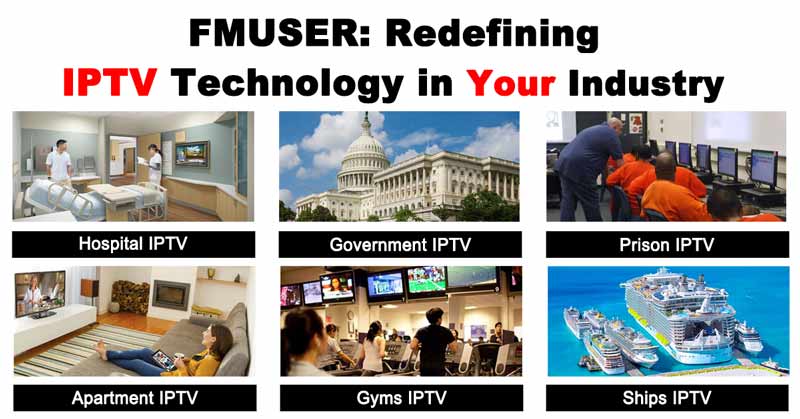
- Hotels & Resorts: FMUSER IRDs empower hotels and resorts to craft a personalized entertainment experience for their guests. By providing a diverse selection of content—including on-demand films and live television—FMUSER helps these establishments boost guest satisfaction and stand out in a competitive hospitality landscape.
- Food and Beverage Venues: Restaurants and bars can utilize FMUSER IRDs to stream live sports and entertainment directly to their patrons. This solution fosters a lively atmosphere that not only captivates customers but also encourages longer stays and increased spending.
- Marine and Cruise Sector: FMUSER IRDs are indispensable for cruise ships and marine operators, granting passengers access to a wide array of content while at sea. This technology ensures travelers can enjoy live broadcasts and on-demand programming, significantly enhancing their overall onboard experience.
- Fitness Centers: Gyms and fitness facilities leverage FMUSER IRDs to deliver engaging content, including live workout classes and instructional videos. This creates an invigorating environment that motivates individuals to remain active and focused during their fitness routines.
- Governmental Agencies: Various government organizations employ FMUSER IRDs to improve internal communication and public outreach. By facilitating live streams of public meetings and training sessions, FMUSER enhances transparency and accessibility for citizens.
- Travel and Transit Hubs: FMUSER IRDs are implemented in airports and train stations to provide travelers with real-time updates on news, entertainment, and vital travel information. By enhancing the waiting experience, FMUSER keeps passengers informed and engaged.
- Educational Institutions: With FMUSER IRDs, schools and universities can offer remote and on-demand educational experiences. This technology enables live lectures and educational content to be streamed directly to students, promoting a flexible and accessible learning environment.
- Internet Service Providers (ISPs): ISPs that incorporate FMUSER IRDs gain a competitive advantage by bundling IPTV services into their offerings. This allows them to meet the increasing demand for digital content while improving customer satisfaction with reliable service delivery.
- Healthcare Facilities: Hospitals and medical centers benefit from FMUSER IRDs by providing patients with entertainment and educational materials during their stays. This not only enhances patient satisfaction but also aids in recovery by offering distraction and valuable information.
- Corporate Organizations: FMUSER IRDs serve as powerful tools for corporate entities striving to streamline communication and training processes. By enabling live streaming of corporate events and important announcements, FMUSER fosters better engagement among employees across different locations.
- Correctional Institutions: Some correctional facilities utilize FMUSER IRDs to bolster rehabilitation initiatives. By providing access to educational and recreational programming, these institutions can encourage personal development and help reduce recidivism rates.
FMUSER IPTV Solutions: Comprehensive Components
At FMUSER, we recognize that a successful transition to IPTV requires a complete and integrated approach. Beyond our professional Integrated Receiver Decoders (IRDs), we provide essential IPTV headend equipment and additional components that support the establishment of new IPTV systems or facilitate upgrades from existing coaxial cable TV systems. Below are the key components that make up our robust IPTV solutions:
1. FMUSER IPTV Encoders
Our series of professional IPTV encoders are designed to meet a diverse range of specifications tailored to your needs. FMUSER offers encoders capable of handling resolutions from Standard Definition (SD) and High Definition (HD) to 4K, 8K, or even higher resolutions. Whether you require an encoder for 1, 4, 8, 12, 16, 20, 24, 48 channels, or more, FMUSER can provide the right solution to ensure high-quality content delivery and efficient bandwidth management.
2. FMUSER FBE700/FBE800 IPTV Gateway Server
The FMUSER IPTV gateway servers ensure seamless content distribution across IP networks, acting as a crucial integration point that enhances the viewing experience by reliably transmitting video content from various sources to end-users. In addition to independent IPTV gateway servers like the FBE800, FMUSER offers all-in-one solutions that integrate IPTV encoders (HDMI/SDI), UHF terrestrial receivers, FTA/CAM tuner receivers (IRD), and the IPTV gateway server itself. Tailored to fit budgets and specific needs, FMUSER can customize solutions to lower operational and equipment costs, ensuring maximum efficiency for clients.
3. FMUSER FBE308 CAM/FTA Tuner Receiver IRDs
Commonly referred to as commercial satellite receivers, our IRDs are essential for enabling the decoding and distribution of high-quality content over IP systems. With advanced features and capabilities, FMUSER IRDs ensure that broadcasters can effectively manage and distribute content across different platforms, providing viewers with a seamless experience.
4. FMUSER SBE302 UHF Terrestrial Receiver
FMUSER's UHF terrestrial receivers are essential for delivering high-quality over-the-air broadcasts, providing seamless access to channels without cable or satellite. With advanced sensitivity for reliable signal reception, multiple output formats for easy integration, and a user-friendly interface, our receivers enhance the viewing experience while ensuring durability and adaptability to future broadcasting technologies.
5. FBE010 IPTV Set-Top Boxes
FMUSER also offers advanced IPTV set-top boxes that provide end-users with a user-friendly interface and access to a multitude of channels and interactive features.
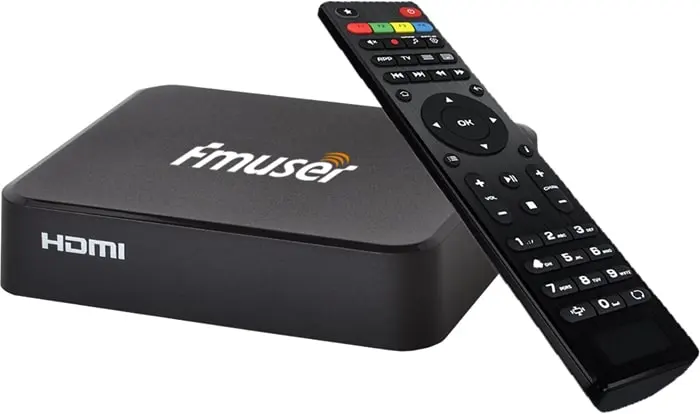
These set-top boxes are designed to enhance the viewer experience, allowing easy navigation and access to a wide range of content options.
6. Additional Essential Components
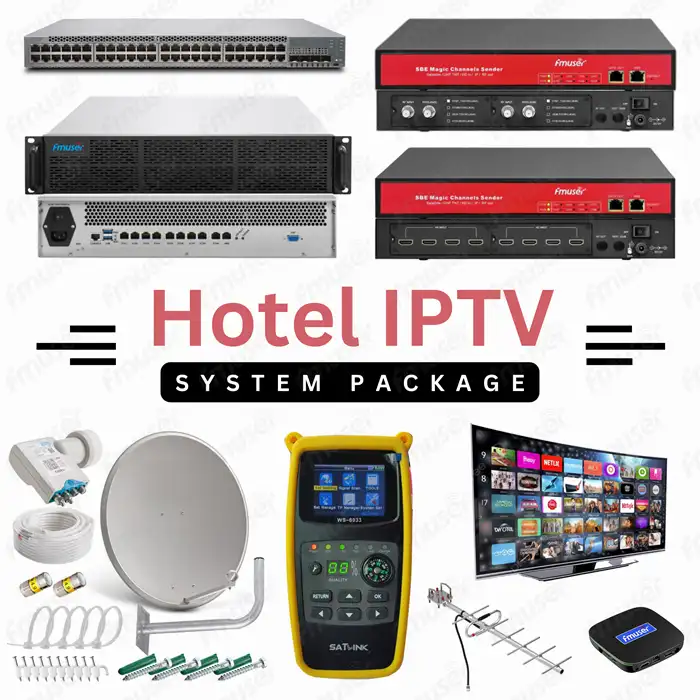
FMUSER's IPTV solutions include more than just headend equipment; we also provide a complete array of necessary components to establish and maintain an efficient IPTV system:
- Compatible Television Sets: Ensuring that all components of the IPTV system work seamlessly together, we provide recommendations for compatible TV sets that enhance the viewing experience. Notably, some Samsung, LG, and Sony models support FMUSER IPTV. Please contact us to confirm whether your specific TV model is compatible.
- Satellite Dish and LNB (Low Noise Block): Essential for receiving satellite signals with high clarity and reliability.
- UHF Antenna: Key components for receiving UHF signals, enabling a broader range of content delivery options.
- Network Switches: Essential for managing data traffic and ensuring efficient connectivity between devices within the IPTV ecosystem.
- RF Coaxial Cables for Satellite Dish: High-quality cables that ensure optimal signal transmission from the satellite dish to the receiver.
- Parts & Accessories: A variety of components that support the installation, maintenance, and enhancement of IPTV systems.
With FMUSER's comprehensive IPTV solutions, operators can confidently transition to or upgrade their IPTV systems, leveraging high-quality equipment and components designed for superior performance and reliability.
Our IPTV Services
At FMUSER, we offer a comprehensive range of services designed to support our clients in maximizing the potential of our FTA Tuner IRD solutions. Our service offerings include:
- On-site Installation Services: We provide professional on-site installation of FTA Tuner IRDs and associated IPTV systems, as well as other IPTV headend equipment, to ensure optimal performance and seamless integration with existing infrastructure. This comprehensive approach allows us to build a complete IPTV headend system for hotels, resorts, and other facilities, ensuring complete satisfaction for our clients.
- Distributor-Oriented Services: Tailored specifically for distributors, we facilitate training and resources that enable them to effectively market and implement our products, ensuring a smooth transition from sales to operational deployment. This includes 24/7 online support, remote assistance, online training, a knowledge base, product warranty, marketing skills and expertise, sales skills development, and other services to help distributors succeed.
- OEM Services: We offer Original Equipment Manufacturer (OEM) services, allowing distributors, including IT solution companies, top management, engineers, and individual or organization satellite installation server providers, to rebrand and customize our FTA Tuner IRDs to fit their market needs. This includes providing technical specifications, branding options, and product modifications to meet specific client requirements.
- Tailored IRD Specifications: Understanding that different clients have unique needs, we offer customization of IRD specifications to align with specific operational requirements. Whether it’s adjusting input formats, output resolutions, or adding specialized features, our team works closely with clients to deliver solutions that best meet their expectations.
- Comprehensive One-Stop IPTV Solutions: We provide end-to-end IPTV solutions, which encompass not only our FTA Tuner IRDs but also IPTV gateways, encoders, and related hardware. This holistic approach ensures that clients can easily navigate their IPTV needs without the hassle of dealing with multiple vendors.
- Dedicated Support Structure: Our commitment to client satisfaction extends beyond the sale of our products. We offer dedicated technical support to assist with any queries or troubleshooting needs that may arise during the implementation and operation of our systems.
- Warranty and Maintenance Services: We stand behind the quality of our products with robust warranty options, including a 2-year warranty and lifetime support. Our ongoing maintenance services ensure that our clients can rest assured that should any issues occur, our support team is ready to provide prompt assistance, ensuring minimal disruption to their operations.
FMUSER’s FTA Tuner Integrated Receiver Decoders (IRDs) are not just devices; they are essential tools that can transform your content delivery and enhance user experiences across various industries. With the ability to provide high-quality live and on-demand television programming, our IRDs cater to the unique needs of hotels, educational facilities, healthcare organizations, and more. Don't miss out on the opportunity to elevate your business and stand out in a competitive market.
Contact us today to learn more about how FMUSER’s innovative IRD solutions can empower your operations and delight your customers!
| Category |
Content | |
|---|---|---|
| FMUSER FBE700 All-In-One IPTV Gateway Server Introduction (EN) |
||
| FMUSER IPTV Solution for System Integrators (EN) |
||
| FMUSER Company Profile 2024 (EN) |
||
| FMUSER FBE800 IPTV System Demo - User Guide |
||
| FMUSER FBE800 IPTV Management System Explained (Multiligual) | English |
|
| Araic |
||
| Russian |
||
| French |
||
| Korean |
||
| Portuguese |
||
| Japanese |
||
| Spanish |
||
| Italian |
Download Now | |
- What is integrated receiver decoder used for?
- The main applications of an Integrated Receiver/Decoder (IRD) are digital television, digital radio, IPTV, Video on Demand (VOD) and video streaming. It works by receiving and decoding a digital broadcast signal into a format that can be displayed or viewed on a television or other media device. The IRD then converts the digital signal into an analog signal that can be viewed on a television. Additionally, the IRD can also be used to control access to certain channels or services, and to decrypt or unscramble a digital signal.
- What are the advantages of intergrated receiver/decoder over others?
- 1. IRDs have a higher level of encryption protection than other receivers, making them more secure.
2. IRDs can receive digital signals from multiple sources, such as satellite, cable, and terrestrial television.
3. IRDs are more energy efficient, as they use less power than other receivers.
4. IRDs require less maintenance, as they don't need to be manually programmed.
5. IRDs provide higher quality and clarity of audio and video than other receivers.
6. IRDs are easy to install and configure.
7. IRDs allow for more customization of programming and settings.
8. IRDs are compatible with multiple devices, such as TVs, computers, and mobile devices.
9. IRDs provide multiple output options, such as HDMI, component, and composite.
10. IRDs offer a wide range of features and services, including Parental Controls, Closed Captioning, and Video On Demand.
- Why IRD (intergrated receiver decoder) is important?
- Integrated receiver/decoders (IRD) are important because they allow you to decode digital signals and receive them in high definition. IRDs can receive satellite and cable digital signals, allowing you to access a wide range of digital programming. They also come with features such as picture-in-picture and digital video recorders, making it easy to watch and record shows.
- How to choose an Integrated receiver/decoder (IRD) in terms of applications?
- 1. Digital TV: Look for an Integrated Receiver/Decoder (IRD) with features such as the ability to decode digital video signals, support for MPEG4 encoding, and a range of compatible video inputs.
2. IPTV: Look for an IRD with features such as support for IPTV, multicast streaming, and compatibility with a wide range of IPTV protocols.
3. Cable TV: Look for an IRD with features such as support for cable TV standards, compatibility with various cable TV providers, and the ability to decode analog signals.
4. Satellite TV: Look for an IRD with features such as the ability to decode digital video signals, support for multiple satellite systems, and compatibility with various satellite TV providers.
5. Terrestrial TV: Look for an IRD with features such as support for multiple terrestrial standards, compatibility with various terrestrial TV providers, and the ability to decode analog signals.
- What are the specifications of integrated receiver decoder you should care?
- The most important specifications of an Integrated Receiver/Decoder that buyers should consider are its decoding capabilities, input/output connectors, resolution, audio/video outputs, remote control compatibility, picture quality, and price. Other important specifications that buyers may want to consider include the size and weight of the unit, the number of tuners, picture-in-picture capability, recording capacity, and various output ports (HDMI, Component, etc.).
- Besides these, always follow these steps before making final decisions:
- Step 1: Determine your needs. Think about what type of content you want to receive, and what type of features you need your Integrated Receiver/Decoder to have.
Step 2: Compare features and prices. Look at different models to find the one that best meets your needs. Consider the number of channels, resolution, audio/video quality, ease of use, and cost.
Step 3: Read reviews. Look for reviews from customers who have bought the same model you are interested in. This will help you get a better understanding of the product and how it performs in real-life situations.
Step 4: Ask questions. If you have any questions about the product, ask the retailer or manufacturer. They should be able to answer any questions you have before you make your purchase.
Step 5: Place your order. Once you have found the Integrated Receiver/Decoder that meets your needs, place your order. Be sure to pay attention to any return policies, in case you are not satisfied with your purchase.
- What are other devices used together with an integrated receiver/decoder in a digital headend system?
- The related equipment or devices that are used in conjunction with an Integrated Receiver/Decoder (IRD) in a digital headend system include modulators, encoders, multiplexers, and scramblers. The IRD works to receive and decode digital signals and then output them. The modulator takes the output from the IRD and modulates it onto a carrier wave so that it can be transmitted. The encoder takes the modulated signal and encodes it in a specific format, such as MPEG-2, so that it can be transmitted. The multiplexer allows multiple signals to be multiplexed onto one signal stream, which is then sent to the scrambler. The scrambler ensures that only authorized users can access the signal.
- What are the differences between Integrated receiver/decoder and satelliete receiver?
- The main difference between an Integrated Receiver/Decoder (IRD) and a satellite receiver is the type of signal they receive. An IRD receives signals from a cable or satellite provider, while a satellite receiver receives signals from a satellite dish. An IRD is usually used to decode encrypted signals from a cable or satellite provider, while a satellite receiver is used to receive signals from a satellite. An IRD typically requires a subscription to a cable or satellite provider in order to decode the signals, while a satellite receiver only requires a satellite dish to receive signals.
- How to choose between FTA and CAM integrated receiver/decoder?
- The main difference between FTA Integrated receiver/decoder and Integrated receiver/decoder with CAM module is in terms of prices, structure, functions, and more.
In terms of prices, the Integrated receiver/decoder with CAM module is usually more expensive than the FTA Integrated receiver/decoder. This is because the CAM module includes additional hardware components that the FTA Integrated receiver/decoder does not have.
In terms of structure, the FTA Integrated receiver/decoder has a simpler design than the Integrated receiver/decoder with CAM module. The FTA receiver/decoder typically has fewer components, which makes it easier to install and maintain.
In terms of functions, the Integrated receiver/decoder with CAM module has more capabilities than the FTA receiver/decoder. It is capable of receiving and decoding encrypted signals, whereas the FTA receiver/decoder can only receive free-to-air signals.
The Integrated receiver/decoder with CAM module also has additional features, such as the ability to record and store programs, access interactive services, and set parental controls. The FTA receiver/decoder does not have these features.
Comprehensive IRD Decoder for Satellite and ATSC to SDI, IP, ASI, and Closed Captioning Solutions
FMUSER’s comprehensive IRD decoder delivers versatile broadcast-grade signal conversion and distribution, supporting satellite (DVB-S/S2), ATSC, cable (QAM/ISDB-T), IP, and ASI interfaces. Engineered for system integrators, this solution decodes RF, IP, and ASI inputs into pristine HD/SD video outputs—including SDI, HDMI, component (YPbPr), and composite (CVBS)—while integrating Dolby AC-3 audio pass-through and closed captioning (608/708 compliance). Its advanced multiplexing capabilities merge ASI and IP streams into unified MPTS/SPTS outputs, functioning as a dynamic ASI/IP/RF gateway. The platform enables bidirectional IP-ASI conversion, multi-stream splitting (up to 32 SPTS IP streams), and hybrid signal distribution via dual ASI ports or IP networks. A web-based interface simplifies PID management, program selection, and stream routing, while dual CAS slots support encrypted content decoding. Ideal for broadcast facilities, satellite headends, and IP-based workflows, FMUSER’s IRD ensures seamless interoperability across terrestrial, satellite, and IPTV infrastructures. Enhance signal flexibility with broadcast-grade reliability—contact our team to tailor this solution to your technical requirements.
Model Options
1. Single-Tuner IRD Decoders
FMUSER’s single-tuner decoders provide dedicated signal processing for targeted broadcast standards, ensuring optimal performance for satellite, terrestrial, and cable workflows.
- Satellite DVB-S/S2 RF decoder with SDI, ASI, and IPTV outputs.
- ATSC Off-Air RF decoder for terrestrial broadcasts, delivering SDI, ASI, and IPTV outputs.
- QAM RF decoder for cable TV systems, supporting SDI, ASI, and IPTV distribution.
- DVB-T RF decoder for terrestrial digital TV, with hybrid SDI/ASI/IPTV output flexibility.
- ISDB-T RF decoder tailored for regional broadcast standards, offering SDI, ASI, and IPTV outputs.
2. Dual-Tuner IRD Decoders
Ideal for high-density environments, these models feature dual independent tuners for simultaneous multi-channel decoding and redundancy.
- Dual DVB-S/S2 satellite tuners with SDI, ASI, and IPTV outputs for multi-program harvesting.
- Dual ATSC Off-Air tuners, enabling parallel decoding of two terrestrial RF signals to SDI, ASI, or IP.
- Dual QAM cable tuners for scalable content extraction and ASI/IPTV distribution.
- Dual DVB-T tuners, optimized for terrestrial multi-channel workflows with hybrid output support.
- Dual ISDB-T tuners for enhanced signal redundancy and multi-program decoding.
Main Features
1. Universal Signal Input & Tuner Compatibility
Maximize compatibility with global broadcast standards using a single platform. The decoder supports diverse RF inputs, IP streams, and ASI feeds, enabling seamless integration into multi-source environments.
- Multi-Standard RF Tuners: Decode ATSC (Off-Air), QAM (Cable), DVB-T/C/S2, ISDB-T, and DMB-T signals with configurable tuners.
- IPTV & Network Integration: Process MPEG-2/4 transport streams via 10/100 Ethernet, supporting unicast or multicast UDP/RTP for scalable IPTV distribution.
- ASI Remux Flexibility: Ingest ASI inputs for program remultiplexing, enabling dynamic MUX creation or 48x SPTS IP streaming outputs.
2. Broadcast-Grade Video & Audio Outputs
Deliver pristine SD/HD content to any display or production system with professional video/audio interfaces.
- Multi-Format Video Decoding: Hardware-accelerated H.264/MPEG-2 decoding to HD-SDI, HDMI, YPbPr (component), and CVBS (composite), supporting resolutions up to 1080p/60.
- Dolby Audio & Captioning: Pass through Dolby AC-3 audio and embed closed captions (608/708 standards) for compliance with accessibility mandates.
- Confidence Monitoring: Built-in front-panel LCD for real-time video verification and troubleshooting.
3. Intelligent Stream Management & Distribution
Simplify complex workflows with integrated multiplexing, gateway, and IP conversion tools.
- Hybrid ASI/IP Multiplexer: Combine programs from ASI and IP sources into unified MPTS outputs for ASI or IP distribution.
- SPTS Stream Splitting: Convert MPTS inputs into up to 32 SPTS IP streams with customizable UDP/RTP addressing for targeted content routing.
- Bidirectional Protocol Conversion: Act as an ASI/IP gateway, transcoding IP-to-ASI or ASI-to-IP with low-latency performance.
4. Secure Control & Operational Efficiency
Maintain full oversight with user-friendly management interfaces and security features.
- Web-Based Configuration: Securely manage PID mapping, stream routing, and tuner settings via an intuitive browser interface.
- CAS Decryption Support: Dual CAM slots for decryption of encrypted programming, ensuring compatibility with conditional access systems.
- Dual Control Access: Operate via front-panel controls or remote web access, ideal for headend or field deployments.
Specifications
| Input | RF Tuner - DVB-S/S2. ATSC Off Air, Cable QAM, DVB-T, ISDB-T (model dependent) DVB-ASI Network IP |
| Supported Output Resolutions | HD-SDI 1080i, 720p, 720i, 576i, 480i HDMI 1080i, 720p, 720i YPbPr 1080i, 720p, 720i CVBS 576i, 480i |
| Video Codecs | H.264 - MPEG-2 |
| Audio Codecs | MPEG1 Layer 2, MPEG2 Layer 2 Dolby AC/3, HD-AAC V2, LC-AAC |
| ASI Input | 1x BNC 188/204 format up to 200 Mbps |
| IP Input | 1x RJ-45 10/100 UDP or RTP up to 85 Mbps |
| RF Input | 1x Type-F ATSC-T: 54-860 MHz 6M Bandwidth QAM: 47-860 MHz QAM16, 32, 64, 128, 256 DVB-S: 950-2150 MHz Symbol Rate 2-45 MBaud DVB-S2: 950-2150 MHz QPSK 1-45 MBaud DVB-T: 145-870 MHz 6, 7, 8 M Bandwidth DVB-C: 45-870 MHz QAM16, 32, 64, 128, 256 ISDB-T: 153-858 MHz 6, 7, 8 M Bandwidth |
| Audio Output | 2x BNC - Analog Unbalanced 2x XLR - Digital AES/EBU 1x Toslink - Digital Optical |
| IP Transport Stream Output | 1x MPTS UDP or RTP 1-32x SPTS UDP or RTP |
| ASI Transport Stream Output | 2x ASI Multiplexed Output 2x ASI Tuner Pass Through |
| Management Interface | Web Based Browser Interface Full Front Panel LCD Interface Front Panel LCD Video Monitor |
| Dimensions | 20 x 18 x 1~1/2 Inches |
| Weight | 7 lbs |
| Operating Temperature | 28º ~110º F |
| *All Specifications Subject to Change Without Notice | |
Why Choose FMUSER’s IRD Decoder?
This all-in-one solution simplifies satellite-to-IP conversion, ATSC-to-SDI decoding, and hybrid ASI/IP remultiplexing, reducing hardware sprawl in broadcast facilities, cable headends, or IPTV networks. With closed captioning compliance, Dolby audio support, and broadcast-grade reliability, it ensures seamless interoperability across legacy and modern infrastructures.
RF-to-IP Conversion & Transmodulation Gateway for Scalable IPTV Distribution
FMUSER’s advanced RF-to-IP gateway with integrated transmodulation simplifies the migration of broadcast RF signals to modern IPTV ecosystems. Designed for seamless integration into headend systems, this versatile solution converts up to eight terrestrial, cable, or satellite RF inputs (supporting ATSC, QAM, DVB-T, DVB-S2, and ISDB-T standards) into high-quality multicast or unicast IP streams. By bypassing re-encoding, the gateway preserves the original compression format (MPEG-2, H.264, etc.) of incoming channels, ensuring direct SPTS/MPTS RTP/UDP delivery across LAN/WiFi networks for playback on IP decoders, mobile devices, or set-top boxes.
Complementing its IP streaming capabilities, the device doubles as a dynamic RF transmodulator, enabling simultaneous conversion of input signals to customizable output frequencies (ATSC, QAM, DVB-T, or ISDB-T). This dual functionality allows operators to modernize legacy RF infrastructure while expanding hybrid IP-RF distribution—ideal for repurposing OTA broadcasts into cable QAM lineups, reorganizing channel assignments, or integrating free-to-air content into existing IPTV services.
Enhanced with ASI I/O ports, PID remapping, and automated PSI/SI generation, the system streamlines service aggregation, filtering, and PCR adjustment for broadcast-grade output. FMUSER’s cost-optimized design empowers system integrators to future-proof broadcast workflows, offering unmatched flexibility in protocol conversion, frequency translation, and multi-device compatibility. Elevate your IPTV deployment with a unified gateway that bridges RF and IP domains effortlessly—contact FMUSER to explore tailored configurations for your next-gen broadcasting or cable TV network.
Model Options
1. RF-to-IP Conversion Gateways
Convert 8 RF inputs to multicast/unicast IP streams for seamless integration into IPTV or OTT workflows.
| Model | Key Functionality | Input Source |
|---|---|---|
| H-8ATSC-IP | ATSC-to-IPTV Gateway | 8× ATSC (8VSB) Antenna Signals |
| H-8QAM-IP | Cable QAM-to-IPTV Gateway | 8× QAM-256/64 Cable Channels |
| H-DVBS2-IP | Satellite-to-IPTV Gateway | 8× DVB-S2 Satellite Feeds |
| H-DVB-T-IP | Terrestrial DVB-T-to-IPTV Gateway | 8× DVB-T Broadcast Signals |
| H-ISDB-T-IP | ISDB-T-to-IPTV Gateway | 8× ISDB-T Terrestrial Channels |
2. Hybrid Transmodulation + IP Gateways
Convert RF inputs to IP streams and transmodulate to new RF outputs, enabling hybrid IP/RF distribution.
| Model | Input Source | RF Output |
|---|---|---|
| ATSC-to-ATSC + IP Transmodulator | 8× ATSC Antenna | 8× ATSC Frequencies |
| ATSC-to-QAM + IP Transmodulator | 8× ATSC Antenna | 8× QAM Cable Channels |
| QAM-to-ATSC + IP Transmodulator | 8× QAM Cable | 8× ATSC Frequencies |
| QAM-to-QAM + IP Transmodulator | 8× QAM Cable | 8× Reprocessed QAM Channels |
| DVB-S2 Satellite-to-ATSC + IP Transmodulator | 8× DVB-S2 Satellite | 8× ATSC Frequencies |
| DVB-S2 Satellite-to-QAM + IP Transmodulator | 8× DVB-S2 Satellite | 8× QAM Cable Channels |
| DVB-T-to-DVB-T + IP Transmodulator | 8× DVB-T Terrestrial | 8× Reprocessed DVB-T Signals |
| DVB-T-to-QAM + IP Transmodulator | 8× DVB-T Terrestrial | 8× QAM Cable Channels |
3. Application Notes
- Broadcast Modernization: Convert legacy ATSC/QAM broadcasts to IPTV for hotels, hospitals, or MDUs while retaining RF compatibility.
- Hybrid Headends: Distribute satellite DVB-S2 content as QAM cable channels or ATSC OTA signals alongside multicast IP streams.
- Frequency Reallocation: Reorganize channel lineups (e.g., consolidate scattered OTA channels into contiguous QAM frequencies).
- Future-Proof Scaling: Add IP delivery to existing RF infrastructure without disrupting current workflows.
Feature Overview
1. Multi-Standard Tuner Support
FMUSER’s gateway simplifies integration with terrestrial, cable, and satellite broadcast infrastructures by supporting a wide array of signal standards. System integrators can consolidate diverse RF inputs into a unified IPTV workflow, reducing hardware complexity and operational costs.
- 8x Universal Tuners: Simultaneously process 8 RF channels across ATSC (8VSB), QAM-256/64, DVB-T, DVB-S2, or ISDB-T standards, enabling flexible signal sourcing from OTA, cable, or satellite feeds.
- Dynamic Signal Compatibility: Handle MPEG-2 and H.264 video formats with AC3/MPEG2 audio, ensuring compatibility with legacy and modern broadcast streams.
- Closed Caption Preservation: Maintain accessibility compliance by retaining embedded captions during conversion.
2. High-Performance IP Output & Transmodulation
Deliver broadcast-grade content over IP networks or hybrid RF-IPTV systems with low-latency streaming and customizable output configurations.
- Dual Streaming Modes: Output multicast (IGMP) or unicast UDP/RTP streams, with optional SPTS/MPTS formatting for targeted channel distribution.
- ASI/IP Hybrid Flexibility: Convert 2x ASI inputs to IP alongside RF-to-IP streams, or combine signals into a single MPTS for simplified headend management.
- RF Transmodulation: Convert incoming ATSC/QAM/DVB-T signals to new RF frequencies (e.g., QAM-to-ATSC), enabling channel lineup reorganization without re-encoding.
3. Intelligent Signal Processing & Control
Optimize content delivery with granular control over multiplexing, filtering, and network management.
- Programmable Service Selection: Isolate specific channels for SPTS output via PID remapping and service filtering, reducing bandwidth strain.
- Automated PSI/SI Generation: Ensure seamless set-top box compatibility with auto-generated program metadata.
- Low-Latency Mode: Achieve 10-20ms processing delays for live sports or real-time applications.
4. Enterprise-Grade Reliability & Scalability
Built for 24/7 broadcast environments, the gateway ensures uninterrupted operation and future-proof scalability.
- Full HD Preservation: Transparently convert RF to IP without quality loss, maintaining pristine 1080p resolution.
- Web-Based Management: Configure, monitor, and troubleshoot via an intuitive browser interface with SNMP support.
- Robust Warranty: Backed by a 2-year manufacturer warranty for risk-free deployment.
Specifications
| Input | 8 x ATSC Antenna 8 x Cable QAM 8 x Satellite S2 8 x DVB-T Antenna 8 x ISDB-T Antenna |
| Supported Resolutions | All HD and SD |
| Video Codecs | MPEG-2 HD 1.5-19.5 Mbps H.264 HD 0.8-19.5 Mbps |
| Audio Codecs | MPEG-1 Layer II MPEG-2 AAC MPEG-4 AAC AC3 Dolby |
| Audio Sample Rate | 48 kHz |
| Audio Bit Rates | 64 kbps, 96 kbps, 128 kbps, 192 kbps, 256 kbps, 320 kbps |
| Modulation Standard | ATSC, DVB-C, DVB-S2 (model dependent) |
| RF Frequency Range | 30-960 MHz for QAM and ATSC, 850-2100Mhz for L-band |
| Input RF Power Level | 5-35 dBmV |
| IPTV Output | MPTS over UDP, RTP/RTPS out as mirror of ASI output (RJ45) |
| Power Input | 100-240 VAC Auto-Switching ~ 20 W |
| Dimensions | 19 x 9 x 3 Inches |
| Weight | 6 Pounds |
| Operating Temperature | 32-110 F |
| *All Specifications Subject to Change Without Notice | |
Why Choose FMUSER’s Solution?
This RF-to-IP gateway bridges legacy infrastructure and modern IPTV ecosystems, empowering integrators to modernize broadcast workflows while retaining existing RF investments. With support for ATSC/QAM transmodulation, multi-format IP streaming, and low-latency outputs, it’s ideal for cable operators, hospitality networks, or broadcasters seeking hybrid distribution agility.
16 RF Tuners for IPTV: Off-Air ATSC, Cable QAM, Satellite DVB S/S2, and DVB-T/T2 to IP Gateway
FMUSER’s advanced 16-tuner RF-to-IP gateway seamlessly bridges broadcast and IP networks, enabling efficient conversion of 16 concurrent Full HD TV signals from terrestrial (ATSC, DVB-T/T2), cable (QAM A/B, ISDB-T), or satellite (DVB-S/S2) sources into IP streams. Engineered for flexibility, the platform scans non-adjacent FTA frequencies, extracts individual video/audio programs, and delivers them as UDP unicast or multicast streams. Unique transmodulation capabilities allow reconfiguring input signals to alternate RF channels or modulation standards, while integrated ASI ports and IP re-muxing support MPTS aggregation from up to 512 inputs for unified distribution. Designed for global compatibility, hardware-specific models are tailored for regional standards—ATSC, DVB-S2, or multi-format QAM variants—ensuring optimal performance in cable headends, broadcast facilities, or IPTV hubs. The system’s centralized NMS simplifies configuration, monitoring, and security, empowering operators to future-proof content delivery with scalable, standards-driven architecture. For integrators seeking to modernize legacy RF workflows, FMUSER’s solution combines carrier-grade reliability with adaptive IP networking, reducing infrastructure complexity while maximizing content reach. Contact FMUSER or authorized partners for region-specific hardware guidance and tailored deployment strategies.
Model Options
- 16 QAM to IP Gateway (unit includes QAM(A&B), DVBT, DVBT2, and ISDBT)
- 16 ATSC to IP Gateway
- 16 DVBS/S2 to IP Gateway
Main Features
1. High-Efficiency RF Input & Signal Integrity
Optimized for diverse RF environments, the gateway ensures reliable capture and conversion of broadcast signals with minimal quality loss.
- Multi-Standard Tuner Array: 16 independent tuners support ATSC, DVB-C QAM A/B, and DVB-S/S2 inputs, enabling simultaneous processing of terrestrial, cable, or satellite sources.
- Precision Signal Quality: MER ≥40dB guarantees superior modulation error ratio, minimizing distortion for crisp Full HD output.
- Non-Adjacent Frequency Scanning: Flexibly tune to scattered FTA carriers without interference, even in congested RF spectrums.
2. Advanced Stream Processing & Modulation
Transform raw signals into compliant, secure IP-ready streams with configurable parameters.
- Dynamic Multiplexing & Scrambling: Combine 16 input streams into multiplexed outputs, apply scrambling for content protection, or remap channels to new QAM frequencies.
- PCR Correction: Accurate Program Clock Reference adjustment eliminates timing jitter, ensuring lip-sync accuracy and stable playback.
- PSI/SI & VCT Customization: Edit program-specific information (PSI/SI) and Virtual Channel Tables (VCT) to align with regional broadcast standards or operator requirements.
3. Scalable IP Output & Distribution
Deliver content seamlessly across IP networks with flexible streaming protocols.
- High-Density IP Streaming: Output 512 unicast or multicast SMPTS streams via UDP/RTP for distributed IPTV networks or targeted content delivery.
- MPTS Aggregation: Merge up to 512 IP inputs into a single MPTS output for simplified transport over ASI or Gigabit Ethernet.
- Transmodulation Flexibility: Convert RF signals between standards (e.g., ATSC to DVB-T) for cross-platform compatibility.
4. Centralized Management & Future-Proof Control
Streamline operations with intuitive, web-based tools for real-time monitoring and updates.
- Web GUI Configuration: Adjust tuner parameters, modulation settings, and stream outputs remotely via an intuitive interface.
- Firmware Updates: Deploy feature enhancements or security patches seamlessly without downtime.
- NMS Integration: Compatible with third-party network management systems for unified oversight of large-scale deployments.
Specifications
| Input | 16 INPUT FTA Tuner selection:: DVB-S/S2 OT ATSC or DVB-C Annex A/B QAM (Model dependent) | ||
| 512 IP (GE1only)input over UDP and RTP protocol | |||
| 2 ASI input, BNC interface | |||
| Tuner Section | DVB-S | Input Frequency | 950-2150MHz |
| Symbol rate | 2-45Msps | ||
| Signal Strength | -65~-25dBm | ||
| FEC Demodulation | 1/2, 2/3, 3/4, 5/6, 7/8 QPSK | ||
| DVB-S2 | Input Frequency | 950-2150MHz | |
| Symbol rate | QPSK 1~45Mbauds 8PSK 2~30Mbauds | ||
| Code rate | 1/2, 3/5, 2/3, 3/4, 4/5, 5/6, 8/9, 9/10 | ||
| Demodulation Mode | QPSK, 8PSK | ||
| Multiplexing | Maximum PID Remapping | 128per input channel | |
| Function | PID remapping (automatically or manually) | ||
| Accurate PCR adjusting | |||
| Generate PSI/SI table automatically | |||
| Modulation Output | Modulation Output format | ATSC or DVB-C Annex A / B QAM ( model dependendt, please chek model selection) | |
| Standard | EN300 429/ITU-T J.83A/B or 8VSB ( ATSC model ) | ||
| MER | ≥40db | ||
| RF frequency | 50~960MHz, 1KHz step | ||
| RF output level | -20~+10dbm(87~107 dbµV),0.1db step | ||
| Symbol Rate | 5.0Msps~7.0Msps, 1ksps stepping | ||
| Constellation | 16/32/64/128/256QAM | ||
| J.83A | J.83B | ||
| Constellation | 16/32/64/128/256QAM | 64/256 QAM | |
| Bandwidth | 8M | 6M | |
| System | Remote management | Web NMS (10M/100M) | |
| RF Out | 16 DVB-C output or ATSC ( model dependendt, please chek model selection) | ||
| IP Out | 1 IP (MPTS) output over UDP and RTP/RTSP (GE1 only) Mirrors one carrier | ||
| Language | English | ||
| Software Upgrading | Web | ||
| General | Dimension (W*D*H) | 482mm×300mm×44.5mm (1RU 19x8x3) | |
| Weight | 3.7kg | ||
| Temperature | 0~45°C(Operation) ; -20~80°C(Storage) | ||
| Power | AC 100V±1050/60Hz; AC 220V±10%, 50/60HZ | ||
| Consumption | 25W | ||
4 Satellite or ATSC IRD Decoders with H-IRD-V4 Quad Tuner & Multiplexer for IP and ASI Output
FMUSER’s robust Quad Tuner & Multiplexer system empowers operators to seamlessly integrate and redistribute content across diverse platforms. Engineered with four independent RF tuner inputs, this solution supports satellite (DVB-S/S2), off-air ATSC, DVB-T, ISDB-T, and cable TV QAM signals (model-dependent), enabling flexible tuning and demodulation of up to four RF carriers. Each input scans and identifies embedded video subchannels, while integrated IP and ASI interfaces allow dynamic remultiplexing of streams from all sources into unified output pipelines. Operators can selectively route programs to IP (multicast/unicast MPTS), ASI, or QAM outputs, ideal for RF-to-IP migrations, CATV channel provisioning, or ASI-based distribution.
With four Common Interface (CI) slots, the platform decrypts encrypted satellite feeds and IP/ASI transport streams using industry-standard Conditional Access Modules (CAMs), ensuring compatibility with major encryption systems. Front-panel controls and a dedicated NMS port enable intuitive local or remote configuration, monitoring, and management via web interfaces. Designed for cable headends, MATV networks, and enterprise environments, this scalable aggregation hub simplifies program bundling, channel stacking, and multi-format delivery—maximizing operational efficiency while future-proofing infrastructure. For tailored integration support, contact FMUSER to explore how this versatile system can optimize your content distribution workflows.
Model Options
- 4 x DVB-S/S2 tuners to IP, ASI and 4 QAM
- 4 x ATSC tuners to IP, ASI and 4 QAM
- 4 x QAM tuners to IP, ASI and 4 QAM
- 4 x DVB-T tuners to IP, ASI and 4 QAM
- 4 x ISDB-T tuners to IP, ASI and 4 QAM
Main Features.
1. Multi-Format Signal Acquisition & Demodulation
Designed for versatility, the system seamlessly processes up to four RF carriers across satellite, terrestrial, and cable TV standards, ensuring compatibility with global broadcasting requirements.
- Multi-Standard Tuner Flexibility: Configure inputs for DVB-S/S2, ATSC, DVB-T, ISDB-T, or QAM (DVB-C) signals (model-dependent), supporting hybrid deployments.
- Subchannel Extraction & Aggregation: Automatically detect and demux all embedded video/audio sub-programs within each RF channel for granular content control.
- Dynamic Descrambling: Integrated decryption for encrypted satellite feeds, ensuring seamless reception of premium content.
2. Intelligent Remultiplexing & Output Customization
Transform raw RF inputs into polished transport streams with configurable output formats, ideal for IP migration, ASI-based workflows, or QAM modulation.
- Multi-Protocol IP Distribution: Deliver up to four independent MPTS streams via UDP, RTP, or RTSP protocols for unicast/multicast IPTV or OTT applications.
- ASI/QAM Output Redundancy: Generate broadcast-ready ASI or QAM outputs for seamless integration with legacy CATV or digital terrestrial systems.
- Closed Caption & Audio Passthrough: Preserve accessibility compliance with support for CEA-608/708 captions and Dolby AC-3 audio transmission.
3. Centralized Control & Operational Efficiency
Simplify monitoring and configuration with enterprise-grade tools tailored for high-demand environments.
- Dedicated NMS Network Port: Remotely manage tuner parameters, output mappings, and system health via web-based interfaces or third-party SNMP tools.
- Modular Tuner Configurations: Choose from five tuner card types (QAM, DVB-S2, ATSC, DVB-T, ISDB-T) to align with regional or operational requirements.
- Low-Latency Processing: Ensure frame-accurate synchronization for live event redistribution or time-sensitive broadcast applications.
4. Security & Future-Readiness
Built to adapt to evolving content protection standards and emerging distribution technologies.
- Conditional Access Integration: Optional CAM module support for real-time decryption of IP/ASI streams and satellite feeds.
- Software-Defined Upgrades: Firmware updates ensure compatibility with emerging codecs, transport protocols, or regional broadcasting standards.
Specifications
| Input | 4 RF Tuner and 2 ASI inputs | |||
| Tuner Section | DVB-S | Input Frequency | 950-2150MHz | |
| Symbol rate | 2-45Msps | |||
| Signal Strength | -65~-25dBm | |||
| FEC Demodulation | 1/2, 2/3, 3/4, 5/6, 7/8 QPSK | |||
| DVB-S2 | Input Frequency | 950-2150MHz | ||
| Symbol rate | QPSK 1~45Mbauds 8PSK 2~30Mbauds | |||
| Code rate | 1/2, 3/5, 2/3, 3/4, 4/5, 5/6, 8/9, 9/10 | |||
| Demodulation Mode | QPSK, 8PSK | |||
| ATSC DVB-T ISDB-T QAM -DVB-C Annex A and B | Input Frequency | 30-999Mhz | ||
| Standard | ATSC A/53 | |||
| Constellation | 8VSB | |||
| MER | /42 | |||
| Multiplexing | Maximum PID Remapping | 128per input channel | ||
| Function | PID remapping (automatically or manually) | |||
| Accurate PCR adjusting | ||||
| Generate PSI/SI table automatically | ||||
| Modulation Output | DVB-C | Standard | J.83A, J.83B, J.83C | |
| MER | ≥42dB | |||
| RF frequency | 30~950MHz, 1KHz step | |||
| RF output level | -30.0~ 0.0 dbm (77~107 dbµV), 0.1db step | |||
| Symbol rate | 2.5 – 4.66 Msps, 5.0 - 8.0 Msps | |||
| J.83A | Constellation | 16/32/64/128/256QAM | ||
| bandwidth | 8M | |||
| J.83B | Constellation | 64QAM, 256QAM | ||
| bandwidth | 6M | |||
| J.83C | Constellation | 64QAM, 256QAM | ||
| bandwidth | 6M | |||
| System | Local interface | LCD + control buttons | ||
| Remote management | Web NMS | |||
| Stream Out | 2 ASI out(BNC type) | |||
| Stream Out | IP (4*MPTS over UDP) out (RJ45, 1000M) | |||
| Upgrading | Web and USB | |||
| General | Dimension | 19x17x2 19"Rack mountable 1RU | ||
| Weight | 3.7kg | |||
| Temperature | 0~45?(Operation) ; -20~80?(Storage) | |||
| Power | AC 100V±1050/60Hz; AC 220V±10%, 50/60HZ | |||
| Consumption | 25W | |||
Why Choose FMUSER?
Our Quad Tuner & Multiplexer eliminates siloed workflows by unifying RF-to-IP conversion, ASI/QAM modulation, and content aggregation into a single 1RU chassis. With scalable output configurations and multi-standard tuner flexibility, it’s the ideal solution for system integrators seeking to reduce infrastructure complexity while maximizing ROI.
Multi-Standard Integrated Receiver Decoder: IP to HD/SD Conversion for MPEG2/MPEG4 and SDI
FMUSER’s Multi-Standard Integrated Receiver Decoder delivers broadcast-grade video and audio conversion for MPEG2/MPEG4 streams, supporting IP, ASI, and RF inputs (including optional QAM, DVB-S2, ATSC, and DVB-T/C). Engineered for versatility, it decodes HD/SD content into pristine HD-SDI, HDMI, YPbPr, or legacy CVBS outputs, ideal for hybrid environments requiring NTSC/PAL compatibility. The platform features advanced downconversion from 1080i/720p HD to SDI/composite formats, ensuring seamless integration with both modern and legacy video systems. Dual PCMCIA slots enable conditional access decryption via CAM modules, while embedded Dolby AC-3 audio pass-through, XLR/Toslink outputs, and 608/708 closed captioning guarantee professional audiovisual synchronization.
Designed for cost-effective scalability, the decoder integrates a web-based NMS for streamlined configuration, allowing users to multiplex ASI/IP inputs into customizable MPTS/SPTS IP outputs or act as an ASI-to-IP gateway with add/drop functionality. A front-end LCD provides real-time confidence monitoring, and the RF tuner supports multi-standard carrier demodulation. With support for up to 32 SPTS streams over IP and simultaneous ASI/IP multiplexing, FMUSER’s solution empowers system integrators to bridge IP, RF, and ASI workflows while reducing operational overhead. Its robust output suite—including HD-SDI, component, HDMI, and analog audio—ensures compatibility with broadcast infrastructure, production systems, or digital displays, making it a future-proof investment for content distribution, satellite decoding, and terrestrial retransmission applications.
Main Features
1. Broadcast-Grade Decoding Capabilities
FMUSER’s decoder ensures professional-quality video conversion, supporting both modern and legacy workflows. With hardware-accelerated decoding, it delivers crisp HD/SD outputs while minimizing latency, ideal for broadcasters requiring reliability and precision.
- H.264/MPEG-2/MPEG-4 Decoding: Hardware-based processing guarantees seamless conversion of IP, ASI, or RF inputs to uncompressed HD-SDI, HDMI, YPbPr, or CVBS outputs.
- Multi-Format Downscaling: Convert 1080i/720p HD feeds to SDI or composite (NTSC/PAL) formats for backward-compatible environments.
- Embedded Audio Flexibility: Stereo audio is embedded into HD-SDI, with additional Toslink and XLR outputs for studio-grade audio synchronization.
2. Cost-Effective Operational Efficiency
Designed for budget-conscious integrators, this platform eliminates unnecessary complexity without compromising broadcast-grade performance.
- Low-Cost Satellite/ASI Decoding: Decode MPTS streams from satellite, terrestrial RF, or ASI sources into cost-effective HD/SD broadcast feeds.
- Front-Panel Program Selection: Easily cycle through MPTS programs via an intuitive interface, simplifying setup in rack-mount or headend deployments.
- Plug-and-Play Scalability: Dual PCMCIA slots enable quick integration of conditional access modules (CAM) for encrypted content decryption.
3. Intuitive Control & Workflow Optimization
Streamline operations with user-centric design and centralized management tools tailored for system integrators.
- Standalone Network Management: Configure, monitor, and troubleshoot remotely via dedicated NMS software, reducing onsite maintenance.
- Real-Time Multiplexing: Combine ASI and IP inputs into a unified MPTS output or generate up to 32 SPTS IP streams for targeted distribution.
- Hybrid Output Routing: Simultaneously deliver HD-SDI, HDMI, and analog outputs, ensuring compatibility with broadcast infrastructure or digital displays.
4. Conditional Access & Content Security
Securely manage encrypted broadcasts with enterprise-grade decryption and access control.
- CAM Card Compatibility: Dual PCMCIA slots support third-party conditional access systems, enabling decryption of pay-TV or satellite feeds.
- Closed Captioning Compliance: Built-in support for 608/708 captioning ensures accessibility for regulatory-compliant broadcasts.
5. Centralized Network Management
Maximize uptime and simplify large-scale deployments with robust remote control capabilities.
- Web-Based Configuration: Adjust RF tuner settings (QAM, DVB-S2, ATSC), program PID filtering, or output formats via a browser interface.
- Multi-Stream IP Gateway: Convert RF/ASI inputs to IP outputs with add/drop functionality, acting as a protocol bridge for hybrid networks.
Specifications
| Input | - Network IP 1x MPTS UDP or RTP 1-32x SPTS UDP or RTP - RF Tuner - ATSC or QAM or DVB-S/S2 - DVB-ASI |
| Supported Output Resolutions | HD-SDI 1080i, 720p, 720i, 576i, 480i HDMI 1080i, 720p, 720i YPbPr 1080i, 720p, 720i CVBS 576i, 480i |
| Video Codecs | MPEG4 (H.264) and MPEG-2 |
| Audio Codecs | MPEG1 Layer 2, MPEG2 Layer 2 Dolby AC/3, HD-AAC V2, LC-AAC |
| ASI Input | 1x BNC 188/204 format up to 200 Mbps |
| IP Input | 1x RJ-45 10/100 UDP or RTP up to 85 Mbps |
| RF Input | 1x Type-F ATSC-T: 54-860 MHz 6M Bandwidth QAM: 47-860 MHz QAM16, 32, 64, 128, 256 DVB-S: 950-2150 MHz Symbol Rate 2-45 MBaud DVB-S2: 950-2150 MHz QPSK 1-45 MBaud DVB-T: 145-870 MHz 6, 7, 8 M Bandwidth DVB-C: 45-870 MHz QAM16, 32, 64, 128, 256 ISDB-T: 153-858 MHz 6, 7, 8 M Bandwidth |
| Audio Output | 2x BNC - Analog Unballanced 2x XLR - Digital AES/EBU 1x Toslink - Digital Optical |
| IP Transport Stream Output | 1x MPTS UDP or RTP 1-32x SPTS UDP or RTP |
| ASI Transport Stream Output | 2x ASI Multiplexed Output 2x ASI Tuner Pass Through |
| Managment Interface | Web Based Browser Interface Full Front Panel LCD Interface Front Panel LCD Video Monitor |
| Dimensions | 20 x 18 x 1~1/2 Inches |
| Weight | 7 lbs |
| Operating Temperature | 28º ~110º F |
| *All Specifiactions Subject to Change Without Notice | |
Analog Video Decoder: 8 Channels from IP TS with CVBS Audio Output
FMUSER’s advanced 8-channel analog video decoder seamlessly bridges modern IP-based infrastructures with legacy systems requiring composite video (CVBS) output. Designed for scalability, this plug-and-play solution ingests digital transport streams via IP or ASI inputs, converting them into up to eight channels of high-quality analog video (CVBS video output) and audio signals. Ideal for system integrators managing hybrid environments, the decoder ensures backward compatibility with legacy equipment while supporting analog video out and CVBS video distribution through both direct analog outputs and ASI passthrough. Simplify setup and configuration via FMUSER’s intuitive network management system (NMS), which enables centralized control for efficient signal routing and monitoring. Whether delivering composite video CVBS output to aging headends or integrating analog-to-IP converter capabilities into modern workflows, this versatile solution guarantees reliable performance, future-proof flexibility, and effortless integration. Elevate your signal distribution with FMUSER’s professional-grade technology—engineered to meet the demands of broadcast, enterprise, and industrial applications. Contact us to optimize your legacy-to-digital transition.
Feature Overview
1. Flexible Input/Output Configuration
Simplify integration across hybrid systems with multi-format support, ensuring compatibility with both modern IP and legacy ASI infrastructures.
- Dual Input Flexibility: Accepts 8 IP transport streams and 1 ASI input for versatile signal aggregation.
- Multi-Channel CVBS Output: Delivers 8 channels of composite video (CVBS video output) with unbalanced stereo audio for legacy device connectivity.
- ASI Passthrough: Distribute decoded analog video out and digital streams simultaneously via ASI for hybrid workflows.
2. Advanced Decoding & Compatibility
Future-proof your setup with broad codec support, ensuring seamless playback across diverse content formats.
- Universal Codec Support: Decodes MPEG-2, H.264, and AVS+ video, plus MPEG1 Layer 2/AC3 audio for unmatched format adaptability.
- Analog-to-Digital Bridging: Convert IP streams to analog video (CVBS output) while maintaining compatibility with analog-to-IP converter workflows.
3. Real-Time Performance Monitoring
Optimize signal integrity and troubleshoot proactively with precision monitoring tools.
- Bit Rate Analytics: Track real-time bit rate metrics to prevent signal degradation and ensure consistent quality.
- Carrier-Grade Reliability: Built for 24/7 operation with ultra-stable hardware, minimizing downtime in critical environments.
4. Centralized Management & Control
Reduce operational complexity with intuitive tools for seamless system oversight.
- Unified NMS Integration: Configure, monitor, and manage the decoder remotely via a user-friendly web interface.
- Front-Panel LCD: Adjust settings locally with a clear, responsive display for on-site troubleshooting.
Specifications
| Input | 8 IP (MPTS/SPTS) (100Mbps Ethernet) (RJ45) | |
| IP Protocol | UDP and RTP (Unicast/multicast) | |
| 1 ASI (BNC) | ||
| Decode | Video Format | MPEG-2/H.264/AVS+ |
| Interface | 8 CVBS (RCA) | |
| Video Resolution | 576i@25fps, 480i@29.97fps | |
| Audio Format | MPEG-1 Layer 2, AC3 (2.0) | |
| Interface | 8 Unbalanced stereo (RCA) | |
| General | Operation | LCD display/Control button; Web-server |
| Language | English | |
| Dimension (LxWxH) | 44 mm×482 mm×410mm | |
| Environment | 0~45°C (Work); -20~80°C (Storage) | |
| Power Supply | 220VAC±10%, 50Hz | |
| Consumption | <25W | |
Why Choose FMUSER?
Designed for system integrators, this 8-channel decoder bridges analog video out needs with IP-driven infrastructures. Whether upgrading legacy CVBS video systems or deploying hybrid IP/ASI networks, FMUSER’s solution delivers reliability, scalability, and effortless control. Contact us to explore how our composite video CVBS output technology can future-proof your AV workflows.
4K HEVC HD Video Decoder - IP Stream Input with HDMI Output
FMUSER’s advanced 4K HEVC video decoder redefines IP-based video delivery, offering seamless integration of IP streams into HDMI displays for dynamic AV environments. Engineered to decode HEVC streams (H.265/2160p) with unparalleled efficiency, this compact decoder supports resolutions up to 4K UHD, ensuring crystal-clear playback for digital signage, live broadcasts, surveillance, and multimedia distribution. Equipped with an RJ45 input and HDMI output, it effortlessly converts IP video feeds—including RTSP, RTMP, HLS, UDP, and multicast protocols—into high-quality HDMI signals, compatible with third-party IP cameras, social media platforms, or private servers.
Designed for system integrators, the decoder features a browser-based GUI for remote configuration, enabling users to schedule content, pull HEVC streams from FTP servers, or loop pre-recorded videos via SD card. Its flexibility shines in diverse applications: digital billboards, airport displays, restaurant menus, hotel welcome screens, and security systems. Support for HEVC/H.265, MPEG-TS, H.264, and AVI formats guarantees compatibility with virtually any media source, while IPv4/v6 and IGMP multicast ensure robust network performance.
Whether deploying full HD HEVC for cost-effective signage or 2160p HEVC for immersive 4K advertising, FMUSER’s decoder empowers professionals to deliver dynamic, real-time content. Ideal for government, education, hospitality, and retail, this solution merges cutting-edge HEVC decoding with effortless scalability—transforming IP streams into captivating visual experiences. Elevate your AV infrastructure with a device built to decode, adapt, and impress.
Core Features
1. Advanced HEVC Decoding & Ultra HD Performance
Designed to handle demanding video workflows, this HEVC video decoder delivers flawless playback of 2160p HEVC and H.265 streams, ideal for 4K digital signage or surveillance. Its robust decoding engine ensures compatibility with HEVC, H.264, MPEG-2, and MPEG-TS formats, reducing bandwidth costs without sacrificing quality.
- 4K/Full HD Output: Supports 3840x2160@30fps (4K) and 1920x1080@60fps (Full HD) resolutions.
- Multi-Codec Flexibility: Decode HEVC streams, H.265, H.264, and MPEG-2 for seamless integration with legacy and modern systems.
- High Efficiency: HEVC/H.265 compression reduces bandwidth usage by up to 50% compared to H.264.
2. Comprehensive Network Protocol Integration
Streamline IP-based workflows with support for industry-standard protocols, enabling effortless integration into existing networks for live broadcasting, IP cameras, or multicast distribution.
- Dual-Stack IP Support: IPv4/v6 compatibility ensures future-proof network adaptability.
- Live Streaming Protocols: RTSP, RTMP, HLS, RTP, FTP, and IGMP multicast for real-time content delivery.
- Player 265 Compatibility: Decode HEVC streams from third-party cameras, social media, or private servers.
3. Flexible Media Playback & Local Storage
Preload content or loop recordings directly from local storage, perfect for digital signage, airport displays, or scenarios with intermittent connectivity.
- SD Card & USB Playback: Store and play pre-recorded HEVC videos, advertisements, or emergency alerts.
- Scheduled Content: Automate playback cycles via the intuitive browser-based GUI.
4. Enterprise-Grade Security & Control
Protect sensitive video streams and manage deployments remotely with robust security features tailored for government, military, and corporate use.
- IP Address Filtering: Restrict access to authorized devices only.
- Password Protection: Secure the GUI and device settings with customizable credentials.
- NMS Integration: Monitor and control decoders across networks via SNMP or HTTP APIs.
5. Universal Compatibility & Scalability
Built to work seamlessly with third-party hardware and software, this decoder supports a wide range of formats and applications, from digital billboards to distance learning.
- Multi-Format Support: MPEG-4, AVI, MOV, and MPEG-TS playback ensures compatibility with most media sources.
- HD HEVC Encoder Synergy: Perfectly pairs with FMUSER’s HD HEVC encoders for end-to-end 4K workflows.
Specifications
| Interface | |
| Input | Rj45x2 10/100 Base-T (1x Management, 1x Streaming) |
| Input | USB2.0-(FAT32) |
| Input | Micro SD-Delivered 16GB USB flash |
| Output | HDMI*1 |
| Video Decoding | |
| Resolution | Max. up to 1920x1080 @60fps, 3840x2160 @30fps |
| Protocol | IPv4/v6, TCP, UDP, HTTP, HLS, RTP, RTSP,RTMP, IGMP(Multicast) |
| Media formats | MPEG-TS, MPEG4, AVI, MOV, MPEG, MKV |
| Audio Decoding | |
| Format | Mpeg1L2, MP3, AAC-LC, HE-AAC, WMA |
| Sample rate | 32/44.1/48KHz |
| System | |
| Management | Web NMS – IP 192.168.0.168 |
| Language | English |
| Security | Password protection, IP address filtering |
| General | |
| Power supply | DC 12V 2A |
| Display | LCD panel @ 2 x 16 characters LED X5 (Ch1~4+USB) |
| Dimensions | 114 x 110 x 44 mm |
| Weight | 270g |
Why Choose FMUSER?
This HEVC decoder combines cutting-edge 2160p HEVC decoding, enterprise security, and unmatched protocol flexibility, making it the go-to solution for system integrators. Whether deploying Full HD HEVC for cost-effective digital signage or 4K HEVC for immersive advertising, FMUSER’s technology ensures reliability, scalability, and effortless integration. Elevate your AV infrastructure with a device engineered to decode, adapt, and outperform.
CONTACT US


FMUSER INTERNATIONAL GROUP LIMITED.
We are always providing our customers with reliable products and considerate services.
If you would like to keep touch with us directly, please go to contact us
